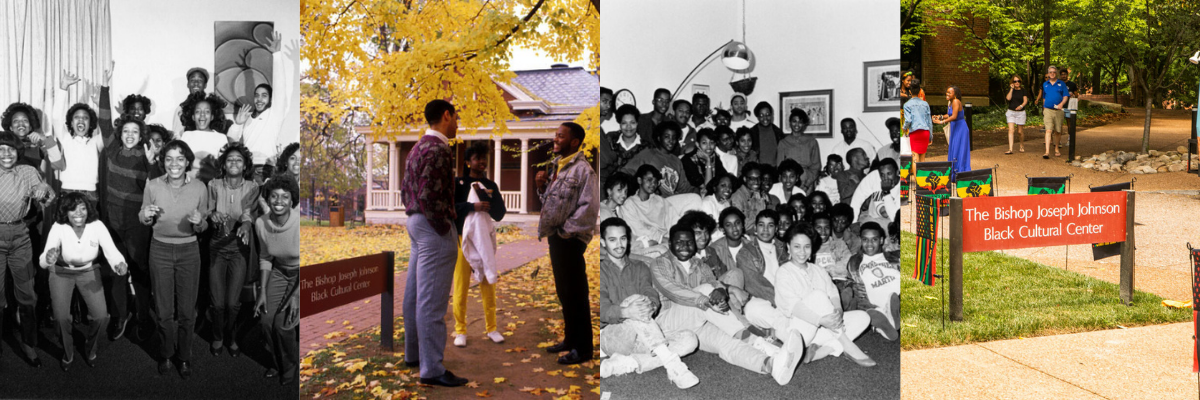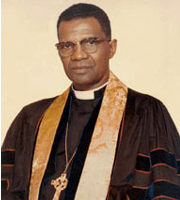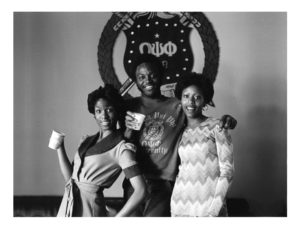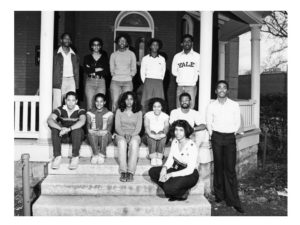History
When Joseph Johnson became the first black student to attend Vanderbilt University, the entire nation was in the throes of change. It was 1953, a year before the Supreme Court’s historic Brown v. Board of Education decision that racial segregation in public schools, including public universities, was unconstitutional. Johnson’s admittance to Vanderbilt was also two years before key turning points – the tragic lynching of Emmett Till and the courageous Montgomery Bus Boycott – in African Americans’ struggle for equal rights.
On Sept. 28, 1953, Johnson entered Vanderbilt University as a special student. His acceptance to Vanderbilt by then Chancellor Harvey Branscomb and the Board of Trust signaled both change and courage. Johnson, who was 39-years-old, married and a father and a pastor, wished to pursue a Ph.D. in Theology. His admission was an exceptional step for both the Board of Trust and Johnson. As a special student in the School of Religion, Johnson earned the bachelor of divinity degree in one year, fulfilling the requirements for the degree on April 1, 1954. Following four years of graduate study, Johnson received his Ph.D. in 1958, becoming the first African American to earn a doctorate at Vanderbilt University. In the preface to his Ph.D. dissertation, Johnson thanked Branscomb, Dean Benton, the dean of the Divinity School, and the Vanderbilt University Board of Trust, who, “in 1953 opened the doors of a great University to qualified Negro students.”
Johnson’s admittance to and graduation from Vanderbilt was not without opposition, but the historic change in the university’s student body was not met with as much controversy as one might have expected. In 1954 when his name was called to receive his bachelor’s degree, “the audience broke out into prolonged applause.” Nevertheless, some dissenters felt that “one of the greatest mistakes ever made in the history of Vanderbilt University” was Johnson’s admission.
In the years following Johnson’s admission and graduation, Vanderbilt would periodically admit other African-American students – Frederick T. Work and Edward Melvin Porter were the first African American students admitted to the university’s law school in 1956 – for example. Work and Porter graduated in 1959.
However, it was in the spring of 1960 when another African American divinity student, James Lawson, would challenge Vanderbilt’s self-identity and Jim Crow laws in Nashville. Lawson was a 30-year-old transfer student from Oberlin School of Theology when he entered the Divinity School in 1958. In 1960, he was expelled from the school for his leadership role in the Nashville sit-ins. A Gandhian pacifist and a leader in the principles of non-violent resistance for social change, Lawson had been training black students from Fisk and Tennessee State (then Tennessee A&I) universities, and American Baptist College in the methodology of non-violent resistance. Lawson’s expulsion was controversial, as several members of the Divinity School faculty resigned in protest. The expulsion generated national headlines and prompted other Vanderbilt faculty members to resign in protest. A compromise was worked out later to allow Lawson to complete his degree from Vanderbilt, but he chose to transfer to Boston University, where he later graduated.
While Vanderbilt’s graduate and professional schools had slowly opened their doors to integration, it was not until 1964 that the university admitted its first class of black undergraduates. Those early African American undergraduates— Robert J. Moore, Dorothy Wingfield Phillips, Diann White Bernstein, Maxie Collier, Earl LeDet, Norman Bonner and Randolph Bradford—helped pave the way for the Vanderbilt we know today. For these students, it was sometimes lonely, and it was challenging academically, but they met the challenges and helped forge and strengthen a proud legacy.
Many of these notable alumni have a continued presence on campus, whether it is through participation in events hosted by the Association of Vanderbilt Black Alumni (AVBA) or the university’s dedication of the Bishop Joseph Johnson Black Cultural Center in honor of the university’s pioneering first student.
The Rev. Lawson’s relationship with the university also has continued since the 1960s. Recognized by the Vanderbilt Alumni Association as a Vanderbilt Distinguished Alumnus in 2005, Lawson taught on campus from 2006 to 2009 as a Distinguished University Professor. In 2007, Vanderbilt established the James M. Lawson Jr. Chair at Vanderbilt in his honor, and in 2013 he donated a significant portion of his papers to Vanderbilt Libraries’ Special Collections.
On April 12, 1984, the Bishop Joseph Johnson Black Cultural Center was dedicated at Vanderbilt University to honor Bishop Joseph Andrew Johnson, Jr. the first African American to graduate from the university. He was not only the first African-American to attend Vanderbilt University but also the first to graduate, receiving the Bachelor of Divinity in 1954, the first to receive a Ph.D., from the university in 1958, and the first African American elected to serve as a full member of the university's Board of Trusts in 1971.
The dedication included printed remarks from former Vanderbilt University Chancellors, Harvie , and Alexander Heard, as well as William S. Vaughn, former president of the Board of Trust. The speakers all agreed that the dedication of the center was a worthy tribute to his legacy. Branscomb, who participated in the decision to admit Joseph Johnson in 1953, noted that it was "especially fitting that it should be a center where young men and women are following in his footsteps."
Today, the Bishop Joseph Johnson Black Cultural Center is a cultural hub on campus, hosting speakers, guest lecturers, student organizations, and academic opportunities focused on African and African American culture. The center is "a gathering place, a home away from home for students who study in the BCC, gather there for meetings, and learn about African and African American culture through the center's programs."
The center's mission includes cultural and educational programming, student support and development, and community outreach and service. Its roster of renowned speakers includes Angela Davis, Julian Bond, the late Negro Leagues Legend, the late Buck O'Neil, the late Afeni Shakur (mother of the late Tupac Shakur); and Dr. Eugene Richardson of the Tuskegee Airmen. Almost four decades since his death, Bishop Johnson's legacy continues to live in the generations of Vanderbilt students who attend meetings, cultural events, panel discussions, and seminars at the Black Cultural Center. They do so understanding that the barrier was broken and the door was opened by Johnson's courageous decision to apply, attend, and persevere at Vanderbilt University.
The life story of Bishop Johnson takes place at the heart of this historical struggle and represents generations of freedom fighters who struggled for the right to read, to study, to learn, and eventually to be admitted to the nation's best institutions. Thus, Bishop Johnson's life story provides historical context and inspiration for today's generations of students, advocates, people of faith, and others still engaged in the struggle for justice, equality, and inclusion today.




